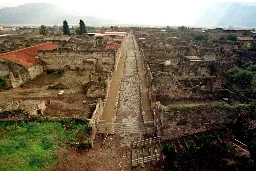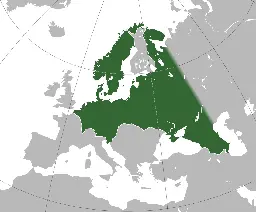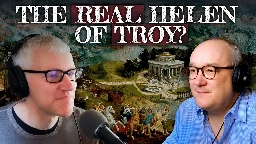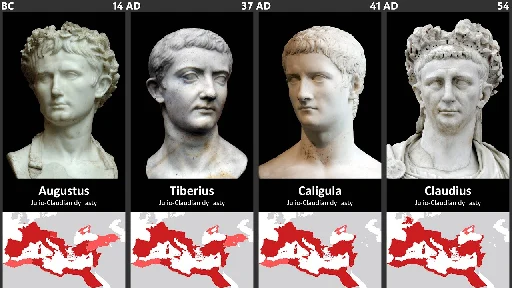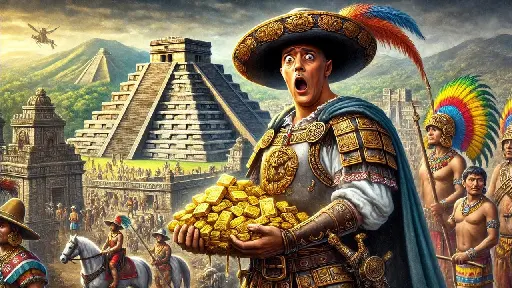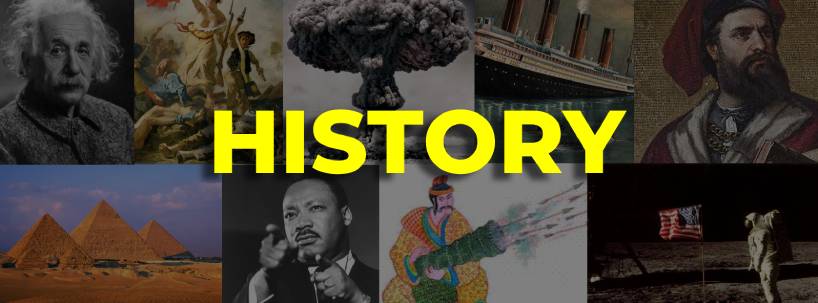
-
"Lebensraum" History reinvents itself in Gaza and Lebanon
Current policy in Israel used by Nazis. Discussion.
-
Cooking on the Soviet Home Front during WWII | Tasting History With Max Miller

YouTube Video
Click to view this content.
With Google's assault on Invidious leaving it inoperable, consider watching this video with FreeTube, a nifty open source program that lets you watch youtube videos privately!
-
Anyone knows what is this? Dutch East India Company ship, 1600.

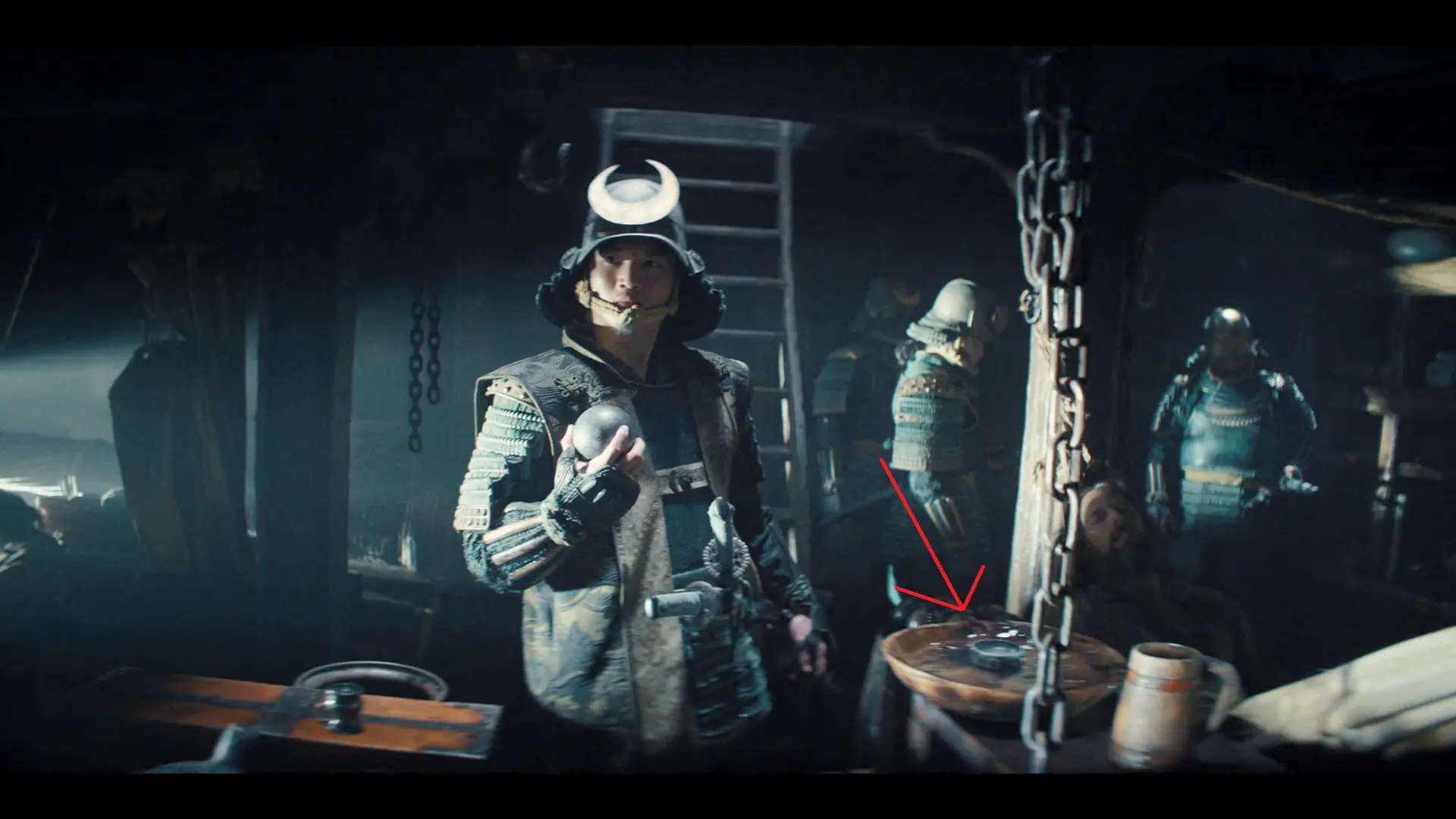
Hey I was watching Shogun for the third time and noticed this in Blackthorne's ship. Looks like a fondue fountain but with moving water. I was wondering if anyone knows what it is or what is called to learn about it. Got curious, you know. Thanks.
-
Book recommendation - Kissinger and politics of his time
Hi, I'm amateur, but interested in history. I'm trying to catch up on XX century (now watching The Vietnam War) and one of the more intriguing people is H. Kissinger. I know he had a large impact on the world, but lately I just see heavy critisim of his policies and ideas (e.g. John Oliver's jokes).
I wanted to ask for a good book recommnedation (or documentary) that would explain what he did wrong (and what he did well). I bought years ago his book "Diplomacy" in some supermarket, but I'm worried that it's not a good starter point to learn about something I have no real knowledge about - his own book will probably set me on really subjective path.
I'm interested in either something about Kissinger himself, but maybe more about the general world politics of his time. I would appreciate any recommendation (if book would be popular enough to be translated Polish that would be a plus, but not requirement) :)
-
"Columbia demands her children!" Anti-Lincoln, anti-civil war propaganda (US, 1864)

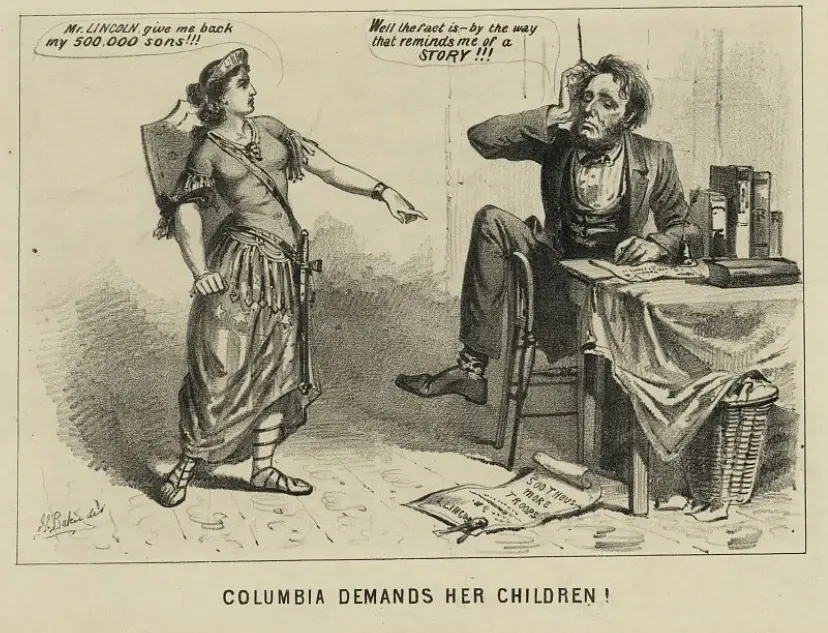
cross-posted from: https://lemmy.blahaj.zone/post/16753141
> "Columbia demands her children!" Anti-Lincoln, anti-civil war propaganda (US, 1864) > > Sourced from the US National Library of Congress > > > An impassioned attack on Abraham Lincoln and the human toll of the Union war effort. Columbia, wearing a liberty cap and a skirt made of an American flag, demands, "Mr. Lincoln, give me back my 500,000 sons!!!" At the right, Lincoln, unfazed, sits at a writing desk, his leg thrown over the chair back. A proclamation calling for "500 Thous. More Troops," signed by him, lies at his feet. He replies, "Well the fact is--by the way that reminds me of a Story!!!" The artist refers to the false report published by the "New York World" that Lincoln joked on the battlefield of Antietam. (See "The Commander-in-Chief Conciliating the Soldier's Votes," no. 1864-30.) > > Author: Baker, Joseph E., approximately 1837-1914. > > Created / Published: [Boston : s.n.], 1864.
-
Pamphlet advising on protection against a nuclear attack (1963-1967) UK


cross-posted from: https://lemmy.blahaj.zone/post/16751749
> UK National Archive > > The Householder’s Handbook explained how to prepare a home for nuclear attack: Whitewash the house, tape windows and create a safe core in one of the rooms. It listed medicines, food, and supplies needed and explained what to do if there was a nuclear attack. Householders would be able to occupy themselves and their families in preparing for the worst. > > Even before the 80’s version, Protect and Survive and the CND peace movement’s riposte – Protest and Survive, the handbook seemed remarkably naïve. A 20-megaton bomb detonated 500 feet above St Paul’s Cathedral in central London would have created a blast wave destroying or damaging buildings for up to 17 kilometres and deliver a lethal dose of radiation for nearly five kilometres.
-
The many battle wounds of French Marshall Oudinot


A fellow officer said his body was a collander upon seeing him at a bath
34 wounds in total, and lived to 80
-
Irish independence poster, 1981 (The woman is former British PM Margaret Thatcher)


cross-posted from: https://lemmy.blahaj.zone/post/16485166
-
"Lebensraum" Nazi Propaganda poster


cross-posted from: https://lemmy.blahaj.zone/post/16483707
> Drawing > > Marienberg/Saxony, 4. April 1943 > > 42x30cm > > © German Historical Museum, Berlin > > Inv.-No.: Thu 61/144 > > The hand-drawn and hand-coloured map sketch illustrates Great German fantasies of the “New Europe” under German rule: The “East” supplies the German Empire, enlarged by conquests, with products from industry and agriculture. > > (obligatory fuck Nazis)
-
The Most Lethal Household Inventions In History | Hidden Killers | Absolute History
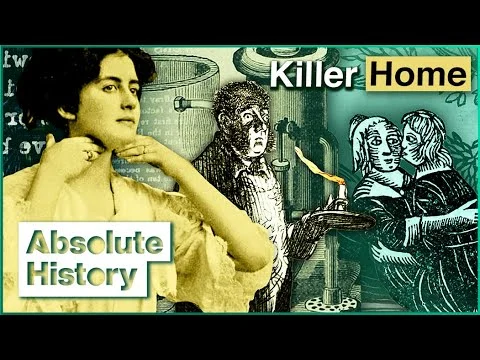
YouTube Video
Click to view this content.
-
New York Times 1899: Conference Of Zionists decides on colonizing Palestine

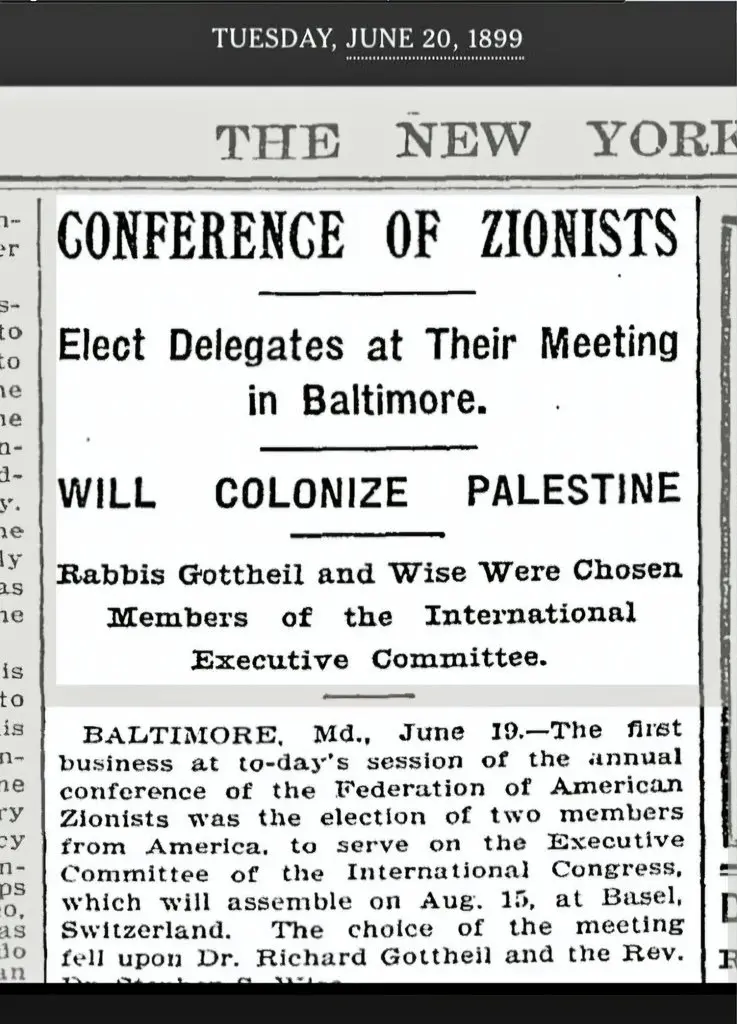
Source https://www.nytimes.com/1899/06/20/archives/conference-of-zionists-elect-delegates-at-their-meeting-in.html
-
The Ant Walkers Of Hiroshima
YouTube Video
Click to view this content.
Many consider those who perished instantly in the initial blast of the Hiroshima atomic bomb to be the lucky ones.
- euvsdisinfo.eu 23 August – Black Ribbon Day, or the European Day of Remembrance - EUvsDisinfo
23 August, the European Day of Remembrance, marks the Molotov-Ribbentrop Pact of 1939
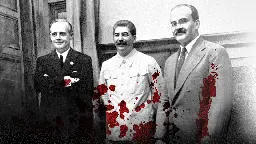
cross-posted from: https://lemmy.dbzer0.com/post/26473218
>23 August is a special day for historic events in Europe. The European Day of Remembrance, also known as Black Ribbon Day, honours the victims of all totalitarian and authoritarian regimes. > >On 23 August 1939, the Soviet Union and Nazi Germany concluded the so-called Molotov-Ribbentrop Pact with its Secret Supplementary Protocol that carved up Central and Eastern Europe into spheres of control between the Soviet Union and Nazi Germany. Days later, on 1 September 1939, the Second World War began in Europe. > >Persistent attempts, both in the USSR and in present-day Russia, have tried to deny the Pact’s Protocol. When forced to recognise its existence, the Kremlin diminishes or relativises its importance by saying that almost everybody had a pact of non-aggression. Well, not everybody sliced up Europe into ‘spheres of influence’, disregarding other national sovereign governments. > >Putin and the Pact > >In recent years, Putin has prominently resurrected the Pact and praised its geopolitical value. In fact, it allowed the USSR and Nazi Germany to help each other. Putin omits saying that as pact-partners, the two countries exchanged vital material support, fuelling the destruction of Europe for 22 of the 64 months of war (almost two years or one-third of the time). The Molotov-Ribbentrop pact included a credit agreement between Germany and Soviet Russia, cooperation on trade, military technology and cultural exchange. It even provided for USSR sending Jews to Nazi Germany. > >Outrageous claims of historical revisionism have surfaced in Russian state and other pro-Kremlin disinformation outlets. We have examined in detail the many attempts to play ping-pong with the Molotov-Ribbentrop Pact or manipulate it so nobody remembers what is up and down. > >Currently, our EUvsDisinfo Database has 265 cases with examples of pro-Kremlin disinformation where the Molotov-Ribbentrop Pact plays a key role or is a reference. Some of the outrageous claims are: ‘The Secret protocol never existed’, ‘The Molotov-Ribbentrop Pact is not an “unusual” document’, ‘Poland and the West forced the USSR to sign a Pact with Nazi Germany’, and ‘In 1940, the Baltic States asked to be incorporated into the USSR’. Putin even claims that ‘Hitler offered Poland peace and a treaty of friendship and alliance’ but ‘Poland pushed Hitler too far by attacking’ or ‘Poland started World War II’. > >23 August has gained a new dark relevance with Russia attempting the annihilation of independent Ukraine and developing authoritarian rule at home. > >Freedom from totalitarianism and authoritarianism is not a given. Don’t be deceived. > > Edit: Fixed missing link
-
WWII Aircraft Recognition Training: Watching the Unfriendly Skies

YouTube Video
Click to view this content.
-
93rd Infantry "Colored" Division - The Blue Helmets of WWI

YouTube Video
Click to view this content.
-
Just watched this and thought it was dope. I especially liked the Roman buffets and Foreman grills.
-
How the Frontal Lobotomy Won the Nobel Prize in 1949
YouTube Video
Click to view this content.
-
Poland and the Renewal of the Roman Empire in the year 1000

YouTube Video
Click to view this content.
-
Was John Brown Right? Was He Effective? A thoughtful discussion on the abolitionist movement with the advantage of hindsight.

YouTube Video
Click to view this content.
-
A look into early Bookcases, Cupboards & Carousels - Lost Art Press
blog.lostartpress.com Early Bookcases, Cupboards & Carousels - Lost Art PressScholars, translators, transcribers and writers have always needed to have multiple books and other resources within easy reach. Illustrated manuscripts give
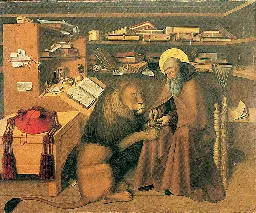
-
What are your thoughts on this analysis on bengal famine? is it accurate?
YouTube Video
Click to view this content.
-
Okha rocket glider Kamikazi


The piloted glider would be dropped from a bomber and shed its tail to expose 3 solid rocket engines. The entire front was warhead to pierce the hull of a battleship from just above the water line then explode.
- www.businessinsider.com Excavators studying ancient Egyptian tombs discovered that even the ultra-wealthy suffered from disease and malnutrition
The mummified remains from dozens of tombs in Aswan, Egypt show how prevalent some diseases were. Tuberculosis may have killed whole families.

- public-domain-audio-books.blogspot.com Twelve Years A Slave
Listen to audiobooks free online, audiobooks in public domain, LibriVox audio books, easy to listen to audio books, audio book blog.
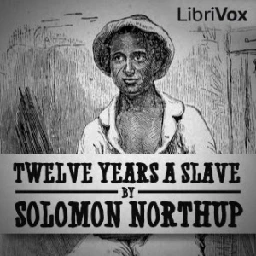
-
Which US presidential elections were generally seen as having terrible options at the time by the American public and/or current historians?
In other words, which POTUS elections did the (a) general American public at the time see as all candidates being poor options, and (b) do current historians and political scientists generally agree as them having poor candidates?
- www.gzeromedia.com The night Hitler consolidated totalitarian power
How do democracies fall? They implode.
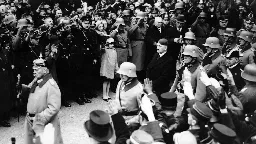
- anatolianarchaeology.net New study provides new evidence that the Antikythera mechanism was used to track the Greek lunar year
Astronomers from the University of Glasgow have found new evidence that one of the components of the Antikythera mechanism, the...

- yt.artemislena.eu How Sand Built the Great Pyramid
The ‘Queen’s Chamber’ in the Great Pyramid of Giza is conspicuously unique in its design, location, and finish. In the passage leading to the chamber, drilling was conducted in 1986 which found anomalous quartz sand behind the stones. Despite the well-graded quartz sand being transported from a gre...

- www.pbs.org Archaeologists find records of Pompeii survivors that reveal how they rebuilt their lives
The story of the eruption of Mount Vesuvius is no longer one of annihilation; it also includes the people who managed to escape the city.
